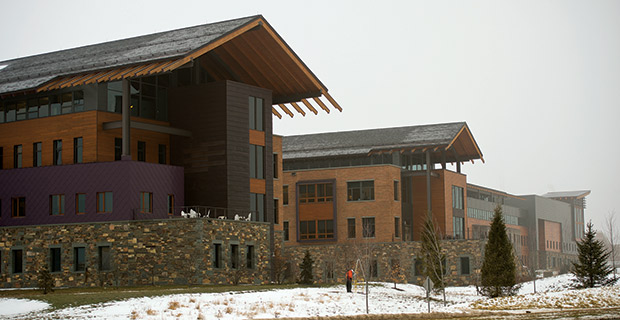SCOTUS takes up Epic case
By: Erika Strebel, [email protected]//January 13, 2017//

The U.S. Supreme Court voted on Friday to take up three cases involving agreements that force employees to take labor disputes to arbitration rather than court, including one originating in Wisconsin.
The justices consolidated the three cases involving the agreements and have allotted an hour of oral argument. Appeals in all three cases were all filed within two weeks of each other.
The 7th Circuit sided in May 2016 with the plaintiff in the Wisconsin case, Epic Systems v. Jacob Lewis, finding that an agreement that Jacob Lewis had signed was unenforceable. The justices on Friday granted Verona-based Epic’s appeal. The case created a circuit split on the issue of whether arbitration agreements in employment contracts are enforceable.
In general, courts have found that arbitration agreements are legally sound. The current state of the law can largely be traced to the broad interpretation that the U.S. Supreme Court started giving to the Federal Arbitration Act in the 1990s. That act, put into effect in 1925 to encourage arbitration between commercial parties, simply provides that arbitration clauses “shall be valid, irrevocable, and enforceable.”
Arbitration clauses were also affirmed in cases the U.S. Supreme Court handed down in 2011 and 2013.
However, Lewis’ suit differs in several ways from those found in the previous, precedent-setting cases. First and foremost, Lewis’ allegations deal with employment law, which was not discussed in any of the Supreme Court cases. Also, those cases had largely concerned the conflicts that arise when both state and federal laws are applied to arbitration agreements. Lewis’ case instead deals only with federal law.
Lewis’ lawyers, Jason Knutson of Habush Habush & Rottier and David Zoeller of Hawks Quindel in Madison, have argued those points in the lower courts. Perhaps their most fundamental contention is that the Federal Arbitration Act should not be read by itself in cases like Lewis’, but rather in conjunction with the National Labor Relations Act. That second act, also known as the NLRA, provides that employees have a right, as a group, to choose either courts or arbitration as a means of bringing a wage claim against an employer.
Support for those arguments comes from the National Labor Relations Board, the agency charged with enforcing the NLRA. The board held in 2012 that employers may not use arbitration agreements to force employees to waive their right to go to court as a class over employment claims.
Generally speaking, courts leave the interpretation of particular laws to the agencies charged with enforcing them. The only exception is for cases in which an agency’s interpretation was clearly erroneous.
Despite these standard practices, three federal appeals courts have essentially chosen to ignore the NLRB’s rulings regarding arbitration agreements. One of the first to do so was the 5th Circuit, which provided almost no explanation when it handed down a decision overturning the NLRB’s holding from 2012, said Marquette law professor Paul Secunda.
Rather than elicit more unanimity, though, Lewis’ case has in fact driven a wedge between federal appeals courts. Judges from different jurisdictions have yet to reach consensus on the question of whether arbitration agreements can violate the NLRA.
The 7th Circuit was the first circuit court to take Lewis’ side, and the 9th Circuit followed in August. Follow @erikastrebel
Legal News
- Wisconsin attorney loses law license, ordered to pay $16K fine
- Former Wisconsin police officer charged with 5 bestiality felony counts
- Judge reject’s Trump’s bid for a new trial in $83.3 million E. Jean Carroll defamation case
- Dozens of deaths reveal risks of injecting sedatives into people restrained by police
- The Latest: Supreme Court arguments conclude in Trump immunity case
- Net neutrality restored as FCC votes to regulate internet providers
- Wisconsin Attorney General asks Congress to expand reproductive health services
- Attorney General Kaul releases update at three-year anniversary of clergy and faith leader abuse initiative
- State Bar leaders remain deeply divided over special purpose trust
- Former Wisconsin college chancellor fired over porn career is fighting to keep his faculty post
- Pecker says he pledged to be Trump campaign’s ‘eyes and ears’ during 2016 race
- A conservative quest to limit diversity programs gains momentum in states
WLJ People
- Power 30 Personal Injury Attorneys – Russell Nicolet
- Power 30 Personal Injury Attorneys – Benjamin Nicolet
- Power 30 Personal Injury Attorneys – Dustin T. Woehl
- Power 30 Personal Injury Attorneys – Katherine Metzger
- Power 30 Personal Injury Attorneys – Joseph Ryan
- Power 30 Personal Injury Attorneys – James M. Ryan
- Power 30 Personal Injury Attorneys – Dana Wachs
- Power 30 Personal Injury Attorneys – Mark L. Thomsen
- Power 30 Personal Injury Attorneys – Matthew Lein
- Power 30 Personal Injury Attorneys – Jeffrey A. Pitman
- Power 30 Personal Injury Attorneys – William Pemberton
- Power 30 Personal Injury Attorneys – Howard S. Sicula











